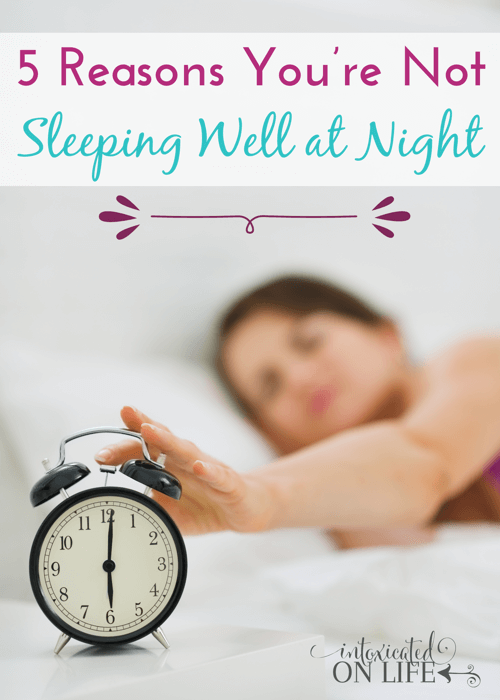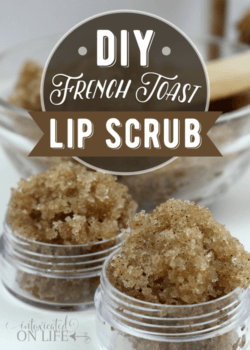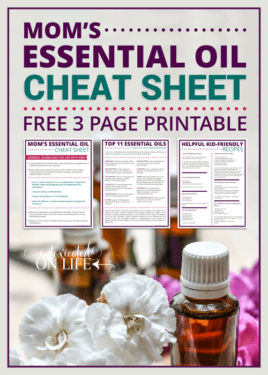It seems like our culture worships the ability to function on little sleep. How often do we hear people boast that they only need a few hours of sleep? (You won’t ever hear that from me. No sir. I love my sleep.)
Sleep impacts not only our overall feelings of well-being, but also our health. Lack of sleep decreases your ability to concentrate and be productive during the day (not make us more productive). It’s harmful to adults and kids alike! If you’re not sleeping well, you’ll end up sick. Lack of sleep impacts your immune system and stresses your adrenal glands.

Special thanks to Breathe Right for sponsoring this post on healthy sleep!
During my twin pregnancy, I was extremely sick and lost much sleep because of discomfort. After having my sweet bundles of joy, sleep continued to evade me. My twins were not what you would call “good sleepers.” I ran on empty for far too long. It impacted my health. I began coming down with colds and other viruses more frequently. Eventually, I could tell it was taking a toll on my overall health. I have no doubt that this chronic lack of sleep for over two years has played a roll in my current health problems with low cortisol levels and adrenal fatigue.
5 Reasos You Might Not Be Sleeping Well
Not everyone can pinpoint so easily why they’re not sleeping well, though. If you’re baffled by why you’re not sleeping well, consider some of the following reasons.
1. Stuffy Congested Nose
Whether it’s from allergies or a cold, we all know nighttime congestion can have a negative impact on our sleep. If you struggled from congestion, I’d encourage you to give Breathe Right nasal strips a try. You might be wondering if they’re all hype though. Do these things really work? Well, I can tell you from personal experience: yes, they definitely do work. It’s not just my opinion. A 2004 article in Biomedical Engineering Online stated:
This study confirmed the results of other studies that showed a reduction of about 10% in nasal breathing resistance, as well as supported the claim of the manufacturer that the nasal strips provide relief.
If you deal with nighttime congestion, I urge you to try out Breathe Right. They will help open your nasal passages so you can breathe better and in turn sleep better.
2. Acid Reflux
This isn’t something I’ve ever had to deal with personally, but my husband has. It is not a fun problem and I know from watching him how absolutely miserable it can be. If you struggle with acid reflux there are several drug-free strategies that may help you avoid acid reflux.
- Be sure to stay upright for a while after eating. Give your food time to digest before laying down. If you can’t sit up right for a while, be sure to sleep with your head slightly elevated.
- Avoid any foods you know that trigger acid reflux in the evening. If you don’t know what foods trigger your reflux, it would be a good idea to keep a food diary for several weeks and record what you eat and when you experience reflux.
- Don’t eat late at night. It’s often those late-night snacks that result in my husbands acid-reflux.
- Try raw apple cider vinegar. If you do eat a food you know that you know has a tendency to trigger your reflux or a late-night snack, take a swig of apple cider vinegar. I know it sounds counter-intuitive, but my husband swears by it. The hypothesis behind why this works is that acid reflux is actually caused by a lack of acid in the gut. When you take antacids you’re not treating the root cause of the problem.
- If those strategies don’t work, be sure to read about how my husband nixed his acid reflux without the use of medications.
3. Your Room Isn’t Dark Enough
Do you sleep with a night-light in your room? Maybe you live in a suburb like we do, light creeping in the sides of the shades. Or maybe you have a clock in your room that emits a bit of light. As strange as it may sound, even a little bit of light can disrupt your sleep. When our bodies are exposed to light, particularly the “blue-waves” of light, it disrupts the production of melatonin.
Melatonin is a hormone that helps get our bodies ready to sleep. The cure isn’t to pop a pill, but to learn how to naturally prepare your body for sleep. At least 1 hour before bed (but preferably when the sun goes down) turn off your tv, close your computer, get rid of all outside sources of light, and allow your body to begin to produce melatonin and relax.
This is obviously not easy to do in this busy world. One thing you can do if you need to be up and around is try out some of these fabulously stylish orange blue-blocking glasses. They’ll help block out the blue-light and allow your body to begin producing melatonin. If you get up in the middle of the night for a quick trip to the bathroom, be sure to put on your cool glasses before turning on any lights—just that brief exposure to light can screw up your melatonin production for the whole night.
4. Caffeine
Fess up. Do you drink caffeine in the late afternoon or evening? If you do, you likely find yourself tossing and turning unable to fall asleep at a reasonable time. I’ll admit it. I do it. I bet a few of you do too. What’s the solution for this? Stop drinking your caffeine-laden beverages in the late afternoon and evening. Easy as that (sorta).
5. You’re Too Keyed-Up at Night
Do you find your mind racing? Are you unable to slow down and relax at night. Two ways to solve that are mentioned above (cut the caffeine at night and be sure to get in the dark so your body can produce melatonin). Another way you can encourage relaxation is through the use of lavender. Lavender is a pretty purple flower often found in gardens. The scent of lavender has been shown to help decrease anxiety and aid in reducing insomnia.
Breathe Right has new lavender scented breathing strips. This is a match made in heaven! Strips that will help open your nasal passage so you can sleep better and will also deliver the scent of lavender to help you relax at night.










Leave a Comment